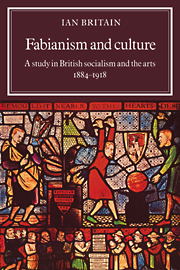Summary
Fabianism has never been famous for its human qualities; there is an impression, indeed, that it had none. Most historians have followed the example of its opponents (or of embittered ex-Fabians) in painting it as a narrowly utilitarian programme of social and administrative reform, more concerned with the mechanisms of politics than with any of the moral or cultural ramifications of socialism. Its adherents have not come off much better. The traditional association of the Webbs in particular with the Fabian sensibility and approach has given them an assured place in British political mythology, but hardly a flattering one. As a mythological pair, continually invoked by their joint name, they seem to have lost their separate identities and any humanizing traits which those identities might impart. It is the same with all of the Fabians when they, or their ideas, are spoken of collectively. If Fabianism has given the Webbs a bleak reputation, by their connections with it, the reverse is at least as true; and, certainly, it is very difficult to disentangle the individuals involved from the ‘group ethos’ ascribed to the Society. The resultant stereotyping, not to say dehumanizing, of Fabian socialism and its adherents is particularly misguided, as it would be hard to find any other kind of socialism as happily eclectic and as studiously undoctrinal.
With respect to the Fabians, the whole notion of a single and cohesive group ethos is something of a myth.
- Type
- Chapter
- Information
- Fabianism and CultureA Study in British Socialism and the Arts c1884–1918, pp. 271 - 273Publisher: Cambridge University PressPrint publication year: 1982

